Late last week, Pauline Hanson’s One Nation dropped another election cartoon. The series has gained both notoriety and infamy for its cutting political commentary that (in a rarity for this hypersensitive world) is genuinely funny. Social media collapsed when the series first aired, as leftwing commentators were left horrified by their reaction – apologising profusely to their followers for the crime of laughing.
Yes. In the modern era you have to apologise for finding something funny.
Very few political figures have escaped the wrath of the cartoonist’s pen, with some of the best depictions being made at the expense of fellow ‘freedom friendly’ party candidates – whether it’s Bob Katter’s perfect cackle, the Clive Palmer Star Wars reference, or Barnaby Joyce looking as though he’s been pulled out of the nearest patch of dirt.
The series has gotten away with harsh truths – remarkable in a world where editors have to self-censor every breath in case they get dragged before a bureaucratic committee. The cartoons have also been educational, letting voters in on a few nasty tricks that politicians would rather be kept a secret.
Now, the cartoon has managed to offend the fragile feelings of the Australian Electoral Commission (AEC). They issued a complaint that saw the cartoon either removed or censored across various social media platforms.
Twitter originally left the video up, but wouldn’t allow anyone to like, comment, or retweet. Their self-appointed ‘fact-checkers’ attached the message below.
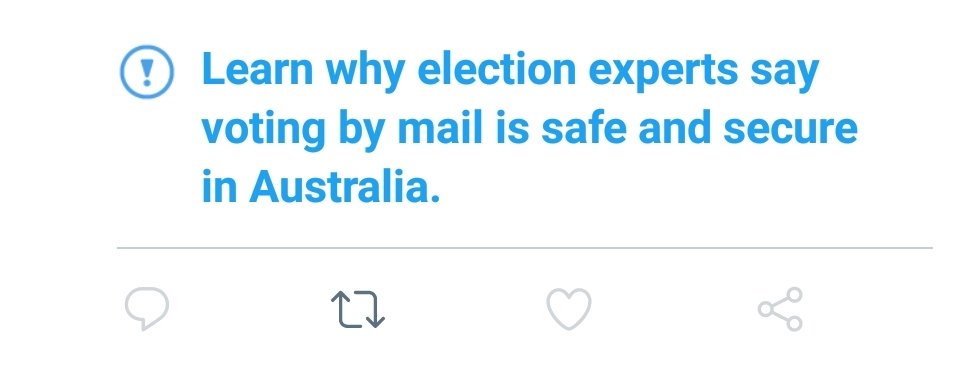
It would be interesting to see Twitter prove this statement in a court of law, given that the AEC’s previous audit reports found inconsistencies and errors in the electoral rolls. Heck, if you have volunteered to hand out flyers in the last forty years, you have probably heard the ‘vote early, vote often’ slogan popularised by over-enthusiastic ‘young’ members from the major parties. Of course, no one can say if these declarations convert to reality – but it’s being said all the same. A series of voting reforms were passed recently (with more on the way) to clean up the known weak points that have potentially led to a small amount of election fraud. The AEC maintain that these inconsistencies have never exceeded the swing required to tip a result.
‘There is no evidence that the level of apparent multiple voting in Australia has ever been sufficient to overturn the margin in any one contest,’ confirmed Evan Ekin-Smyth, an AEC spokesperson. Which is not the same as saying it doesn’t exist.
Late on Saturday afternoon, Twitter relented to the AEC’s self-declared pressure to remove the tweet. An ominous message sits in its place.

Social media giants are sensitive about voter fraud and desperate to protect the concept of ‘safe’ elections considering persistent accusations circle the Biden administration. Plenty went wrong with postal voting in America under the cover of Covid – a lot of which has been caught on camera and submitted for review.
‘This tweet [from One Nation] appears to have weaponised the use of satire or parody. It is disappointing that this device has been used to post hateful, polarising, and divisive content,’ said Dr Anne Kruger, from First Draft – a misinformation research organisation. She appears to have watched a different video to everyone else. First Draft are currently running CrossCheck Australia: election watch 2022.
To quote from their mission statement: ‘Today, we need access to the truth more than ever before. But in this polluted information environment, it’s never been harder to know what to trust, and never easier to be misled. Disinformation is targeting and damaging our communities, all around the world. At First Draft, our mission is to protect communities from harmful misinformation. We work to empower society with the knowledge, understanding, and tools needed to outsmart false and misleading information.’
Curating truth leaves us free speech purists uncomfortable. We would argue that the best defence against misinformation is to submit it to the brutal combat of the public forum. Lies rarely survive the mob.
Paranoia from the American election has spilled into the Australian election, with the AEC trolling Twitter with a level of sass completely inappropriate for a regulatory body. In one case, the AEC Twitter account replied ‘we love it too’ in response to a cartoon that refers to the major parties as ‘Complete Scumbag Party’ and ‘Discreet Scumbag Party’ along with an independent waving an Australian flag who has a policy listed as ‘televised puppy torture’ and a suspiciously teal independent portrayed as the ‘Nice Party’.
One Nation’s (now banned) video voiced a legitimate concern within the Australian political system. With official electoral rolls containing errors, no voter ID required at the polls, and no way to check that people aren’t hopping around voting more than once (or in other people’s names) – voters are within their rights to ask questions about the security of their vote. People are not trying to subvert the election, they are being punished for demanding it be protected.

If we want to talk about outrageous behaviour, the AEC has cut unvaccinated Australians out of their corner of the election process by insisting that all AEC staff be vaccinated. For what reason? The polling booths have to admit the unvaccinated. Everyone is shopping together and catching public transport. Shame on the AEC for using medical discrimination to lock out a political block of voters from part of the election process. It’s no wonder so many people on social media are meeting their ban of One Nations’ video with suspicion and contempt.

When challenged on their behaviour, the AEC became a tad precious.
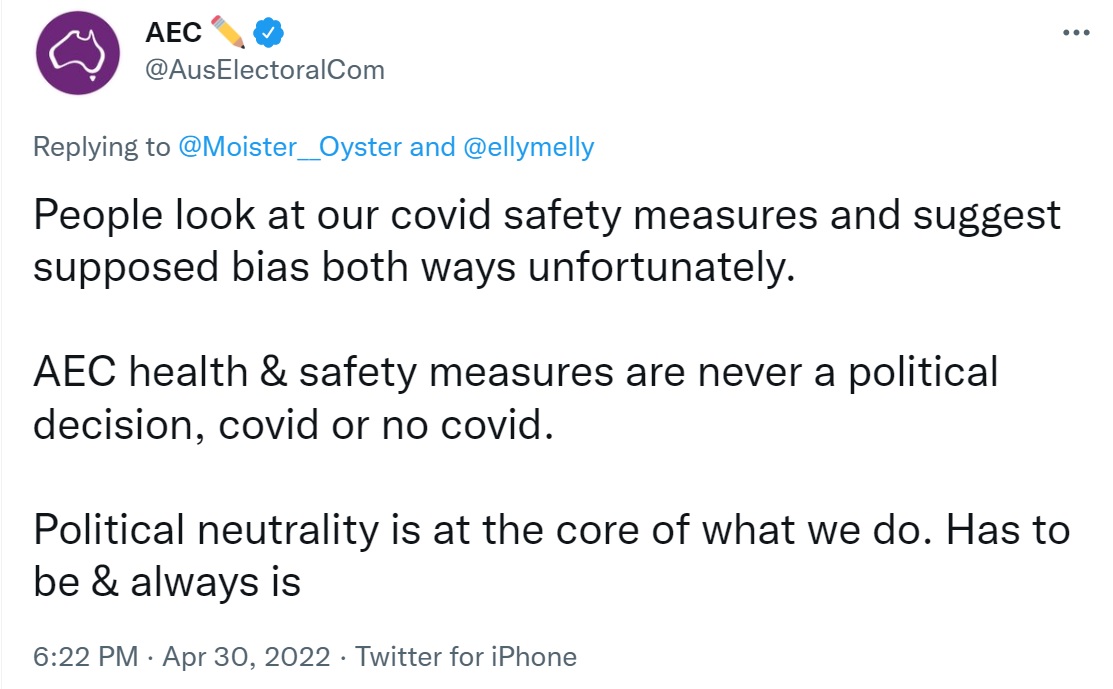
It was then pointed out to the AEC that international health bodies and vaccine manufacturers have confirmed that Covid vaccines do not prevent transmission and that ‘vaccination’ is a political issue – particularly in this election. Vaccine mandates created the largest protest outside Parliament in history. It also led to a revival of ‘freedom friendly’ parties that pose a significant threat to the balance of power – such as One Nation (the party whose video the AEC asked to be removed).
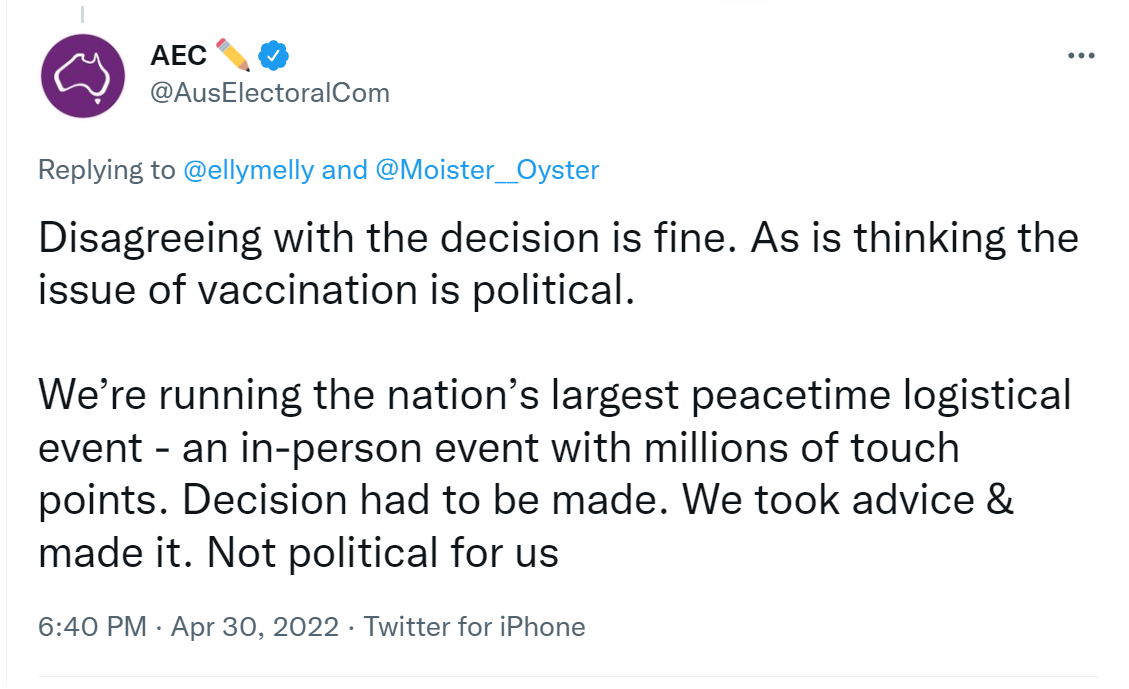
The AEC need to get over themselves. Elections are commonplace, not some kind of inter-war revelation that requires the public to look on them in awe. Plenty of private companies handle more public data with greater efficiency and security than the AEC. Besides, none of this excuses the central issue of what many feel is unethical discrimination.
The moment the AEC moved to ban One Nation’s cartoon – it went viral.
The Australian Electoral Commission conducted an audit of the roll (Integrity of the Electoral Roll) in which they aimed for a 95 per cent completeness. It’s now around 96 per cent. That leaves wiggle room for error, particularly when voters are not required to produce ID to prove that they are who they say.
Under security, the review stated:
‘The audit identified security gaps and risks of unauthorised use of roll data in the scope and regulation of external access to the roll’ and ‘uneven trends are beginning to appear in relation to the accuracy and completeness of the Commonwealth rolls in different States and Territories. There is a need for the AEC to further develop national standards for data used to update the roll, to identify gaps in CRU coverage, and to determine which data are required to address those gaps’.
It also admitted:
‘The AEC does not set targets for, nor measure or report on, the accuracy of the electoral roll. The electoral roll changes continuously. At any one time it will contain inaccurate records, where voters have recently changed address, gone overseas or died, and the AEC has not yet been advised of the change.’
Twenty years later, the AEC published another audit report on their roll, only this time it came with the compulsory lip service to the narrative.
‘Globally, the electoral environment for democracies has become increasingly complex with increasing citizen expectations, more evidence of mis and disinformation, and the implications of the COVID-19 pandemic.’
Disinformation is the new favourite catchphrase of governments seeking to use social media as a means to protect themselves from criticism. It is this cry of ‘disinformation’ that lead the United States to set up a very real Ministry of Truth to combat Elon Musk’s threat to allow free speech on Twitter in line with existing rules governing platforms. In order to protect democracy, say the Democrats, the government must monitor ‘the truth’ in the public forum. Sounds a bit sinister.
The AEC received 96.4 million in the 2020-1 Budget to ‘upgrade’ its security, but no amount of upgrading will solve the problem unless they make sure the person getting their name marked off is who they say they are.
As for our national broadcaster, the ABC, they are more concerned about the hilarious howling bat in Albanese’s bowl of soup, with one article stating, ‘the video also contains a racist trope about the origin of Covid’.
I’m sorry, Covid (allegedly) originated from scientists in China (allegedly) mucking around with bats (allegedly) at a Level 4 viral lab that (allegedly) escaped into the nearby Wet Market in Wuhan where bat soup is (definitely) a real thing. Are the ABC seriously suggesting that blaming China for a virus they created is ‘racism’?
The easiest way for the AEC to provide election confidence would be to make people ID themselves as they get their named checked off the roll and have the rolls update live so that no one can ‘check-in’ twice.
Nah. That would be ‘racist’.
Got something to add? Join the discussion and comment below.
Get 10 issues for just $10
Subscribe to The Spectator Australia today for the next 10 magazine issues, plus full online access, for just $10.

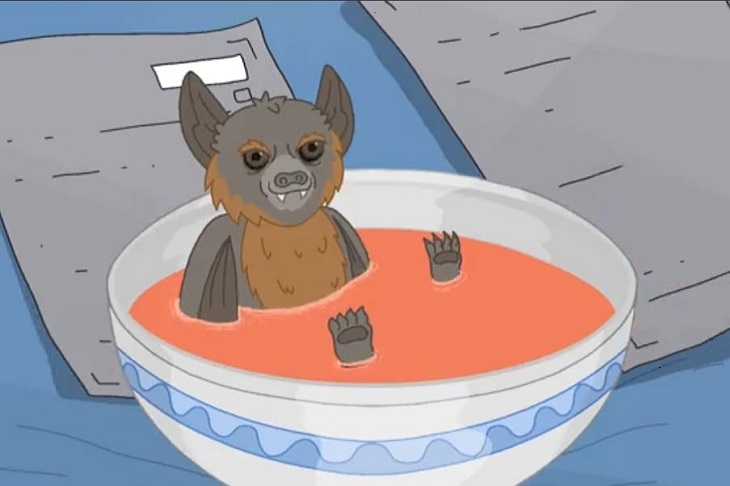



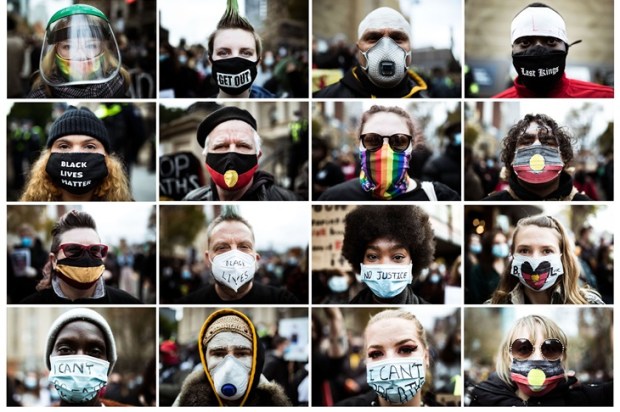
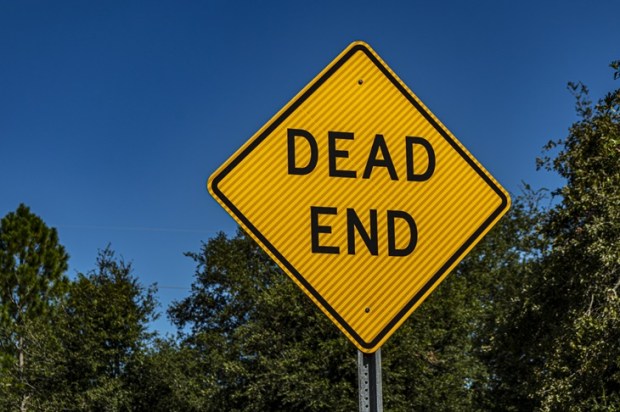
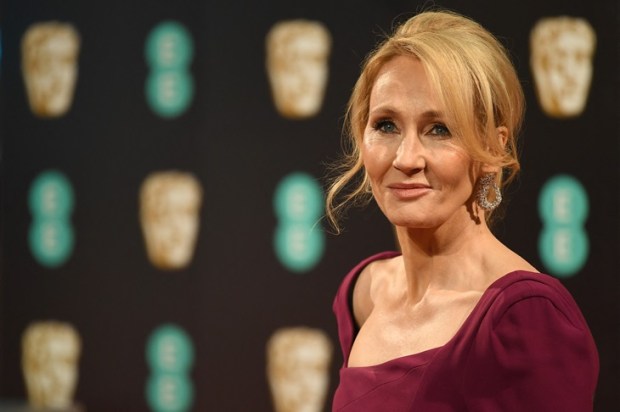


















Comments
Don't miss out
Join the conversation with other Spectator Australia readers. Subscribe to leave a comment.
SUBSCRIBEAlready a subscriber? Log in